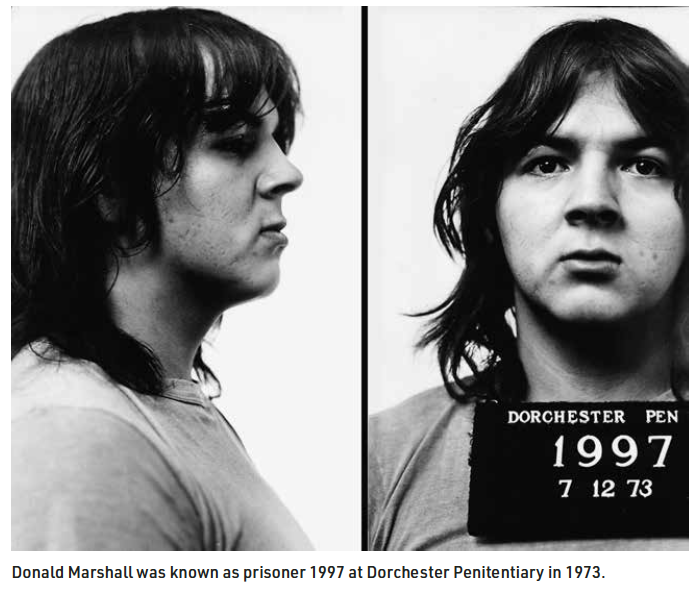While I was working on a story this week about the Mi& #39;kmaq fishery, I came across this mugshot of Donald Marshall Junior from 1973, when he was, I think, 18. Somehow the picture makes the injustice come alive. https://www.macleans.ca/news/canada/mikmaq-fishers-won-at-the-supreme-court-but-theyre-still-fighting-for-their-livelihoods/">https://www.macleans.ca/news/cana...
Marshall spent 11 years in Dorchester serving time for a murder he didn& #39;t commit. So terrible, in part because he served brutally hard time because he wasn& #39;t able to tell parole officers what they wanted to hear: that he accepted responsibility for his crimes.
The picture comes from this book, by his former wife, Jane McMillan, who is now an anthropology professor. https://www.ubcpress.ca/truth-and-conviction">https://www.ubcpress.ca/truth-and... It& #39;s a good book, adding details and a personal perspective to the Marshall story.
Marshall& #39;s exoneration and the public inquiry dominated the news in Nova Scotia when I was a student. Michael Harris wrote an excellent book about the whole thing. https://www.amazon.ca/Justice-denied-versus-Donald-Marshall/dp/0771596901">https://www.amazon.ca/Justice-d... I often think it& #39;s a book that more young people should read.
Not just young people.
In the book, Harris explains some things about the history of the Mi& #39;kmaq that I had no idea about, in particular the way the people of Membertou were forced away from their homes on the shores Sydney Harbour just because white people wanted their land.
What is striking to me about that, and other indigenous history that I have read, is how casually and thoroughly white people disregarded indigenous rights for so long.
Whenever you look deeply into a particular history of a particular place, I think you find the the same thing, beginning around confederation up until the first legal victories recognizing treaty rights, in the 1970s.
It is tempting to turn away because it& #39;s so depressing, the human toll was so great. But I think there are also stories of hope and resilience. The Mi& #39;kmaq, who have been dealing with Europeans for 500 years or more, have been persistent and effective in seeking their rights.
As they were being increasingly forced off the land in the 20th century, pushed into reservations where there was nothing to but sit around and be poor, Mi& #39;kmaq Grand Chief Gabriel Sylliboy went to court to sue for his treaty rights.
Syliboy lost. Never really had a chance. The story is admirably told in The Colonization of Mi& #39;kmaw Memory and History, 1794-1928: The King v. Gabriel Sylliboy, By William C. Wicken, https://utorontopress.com/ca/the-colonization-of-mi-kmaw-memory-and-history-1794-1928-4">https://utorontopress.com/ca/the-co...
But the Mi& #39;kmaq, or course, didn& #39;t give up. And in 1999, Donald Marshall Junior proved that Syliboy had been right, winning fishing rights in the Supreme Court of Canada!
Marshall& #39;s son, Randy Sack, is now exercising that right in Saulnierville, fishing for lobsters. https://www.macleans.ca/news/canada/mikmaq-fishers-won-at-the-supreme-court-but-theyre-still-fighting-for-their-livelihoods/">https://www.macleans.ca/news/cana...
There& #39;s surely still a struggle, but I wonder sometimes if we are communicating enough about successes. In 1999, Mi& #39;kmaq communities had fisheries worth $3m. Now their fisheries are worth a lot: $152 million in 2016.
It makes me wonder if we talk enough about successes in indigenous communities. We need to report on conflicts and problems and the many failures, the legacies of generations of racism, but maybe we should pause from time to time to take note of success stories, resilience, wins.

 Read on Twitter
Read on Twitter



